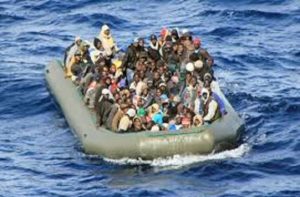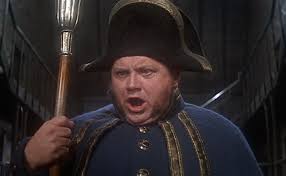1815: Waterloo
May 18, 2020
By AHNZ

Today in New Zealand’s historical back-story, 18 May, war was both declared and won against Napoleon Bonaparte’s French Empire. Declared in 1803, and all wrapped up at the Battle of Waterloo on the same day in 1815 which was 205 years ago today.
 The Napoleonic Wars set the scene for colonising New Zealand but they also explain why these islands had gone untouched for such a long time since Captain Cook’s (1769) or Captain Vancouver’s (1791) expeditions. Waterloo (1815) ended a generation of warfare between Britain and France that had been going on since 1793.
The Napoleonic Wars set the scene for colonising New Zealand but they also explain why these islands had gone untouched for such a long time since Captain Cook’s (1769) or Captain Vancouver’s (1791) expeditions. Waterloo (1815) ended a generation of warfare between Britain and France that had been going on since 1793.
The Musket Wars
 One immediate effect was that military muskets flooded onto the market. For example, the the Brown Bes (image left) firearm that became so plentiful and affordable that even a stone age warrior in the far away South Seas could stockpile them. Hongi Hika with Thomas Kendall, in particular, conducted a huge arms deal for post-Napoleonic weapons at good prices. Thus, after Waterloo, came The Murder Olympics or, aka, The Musket Junkie Wars.
One immediate effect was that military muskets flooded onto the market. For example, the the Brown Bes (image left) firearm that became so plentiful and affordable that even a stone age warrior in the far away South Seas could stockpile them. Hongi Hika with Thomas Kendall, in particular, conducted a huge arms deal for post-Napoleonic weapons at good prices. Thus, after Waterloo, came The Murder Olympics or, aka, The Musket Junkie Wars.
Post-War Social Crisis
After a massive generation-long war ends it doesn’t just leave a glut of arms, it leaves a glut of people. Society had organised itself both socially and industrially along the lines of a war that never ended. The social welfare system of the day, the Poor Laws, became a huge fiscal burden. It was now that thinkers like Thomas Malthus spooked the hell out of everyone with the idea poor people were over-populating the and Earth that could not sustain so many humans. Looking at the world around them, it seemed to people of the time that Malthus was right.
 Lines of trade were disrupted, industries crashed. The labour force swelled with soldiers whose martial services were no longer required. What would all these people do now? For example, the old industries of fishing, weaving, and kelping were obliterated after the Napoleonic Wars. In Scotland this led to forced and unforced evictions, Clearances, of people in favour of sheep. The people emigrated to new shores such as New Zealand’s.
Lines of trade were disrupted, industries crashed. The labour force swelled with soldiers whose martial services were no longer required. What would all these people do now? For example, the old industries of fishing, weaving, and kelping were obliterated after the Napoleonic Wars. In Scotland this led to forced and unforced evictions, Clearances, of people in favour of sheep. The people emigrated to new shores such as New Zealand’s.
In 1825 The New Zealand Company (Mark 1) started trying to solve the social crisis by colonising New Zealand. It didn’t work out on this occasion but the same society had success about 10 years later with their reboot. William Hobson, likewise, would seek to use New Zealand as a solution to the British post-Napoleonic social crisis by setting up British Factory colonies in New Zealand.
 By the time New Zealand really was, properly, opened up for colonisation, in the 1840s/50s, the Britain they were exiting had been marked and changed by the wars with Bonaparte.
By the time New Zealand really was, properly, opened up for colonisation, in the 1840s/50s, the Britain they were exiting had been marked and changed by the wars with Bonaparte.
We had masses of Slave Culture immigrants who expected to be looked after and told what to think and do by authority figures. They were accustomed to living off Poor Laws welfare and to trying to avoid being confined to the State’s Workhouse that every community had- a sort of prison or asylum you would be interned in like Oliver Twist should you be unable to support yourself. These Workhouses were the template for the future New Zealand Welfare State.
 Likewise, of course, post-Napoleonic Victimhood Culture was polished to a new state of the art in its peculiarities and refinement. An entire sub-culture evolved skills and air and attitudes in order to manage and take charge of the masses of displaced Slave Culture folk. Because of State sanction and funding, one could bhave a professional Victimhood Culture Career in ruling Workhouses at various levels of administration. Bossing people around and crowd control, propaganda and punishment, became skills honed to expert levels. This was a class of people that came into their own after the wars in order to manage the masses of displaced people created by the Government’s wars. As with others, these VC people came on the migrant boats to New Zealand to form our colony too. Their descendants make up our massive Public Service bureaucracy today.
Likewise, of course, post-Napoleonic Victimhood Culture was polished to a new state of the art in its peculiarities and refinement. An entire sub-culture evolved skills and air and attitudes in order to manage and take charge of the masses of displaced Slave Culture folk. Because of State sanction and funding, one could bhave a professional Victimhood Culture Career in ruling Workhouses at various levels of administration. Bossing people around and crowd control, propaganda and punishment, became skills honed to expert levels. This was a class of people that came into their own after the wars in order to manage the masses of displaced people created by the Government’s wars. As with others, these VC people came on the migrant boats to New Zealand to form our colony too. Their descendants make up our massive Public Service bureaucracy today.
“They need people to look after, they need for there to be downtrodden to represent so they can fulfil their social purpose even if that means re-defining upwards what poverty or inequality means. They themselves are never poor and nor do they want to socialise with or be familiar with or proximal with these Slave Culture people; They just want to administer and shepherd them.”- 1988: Labour Goes Full Victimhood; AHNZ
So, you see, 18 May is in many ways a crucial key date for the Anarchist history of New Zealand.
.
—
Image ref. Scotland Forever!; Lady Butler (1881)
Ref. Also 1821: Musket Wars Auckland
Ref. Also 1849: On The Government of Colonies
 Like Comment Share
Like Comment Share





